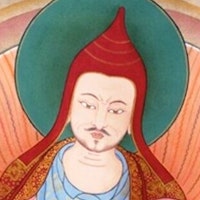As long as space remains, As long as sentient beings remain, Until then, May I too remain And help dispel the miseries of the world.
Shantideva

May I Too Remain
Topic: Love, Compassion, & Kindness
May the fearful become fearless;
May those oppressed by grief find joy;
May those who are anxious
Be rid of their anxiety and feel secure.May health come to the sick;
May they be free from every bondage;
May those who are weak find strength,
Their minds tender towards each other.As long as space remains,
As long as sentient beings remain,
Until then, May I too remain
And help dispel the miseries of the world.
Shantideva
8th-century Indian philosopher, Buddhist monk, poet, and scholar
Life span
c. 685 - c. 763
Major philosophy
Mādhyamaka philosophy of Nāgārjuna
Place of study
Nalanda mahavihara
Shantideva, born around 685 CE in the ancient kingdom of Saurastra, now part of modern Gujarat, India, was a distinguished Indian Buddhist monk and scholar. He was the son of King Kalyanavarman and was initially named Śantivarman. Shantideva's early life was marked by auspicious signs and a deep inclination towards spirituality. Despite his royal lineage, he renounced his princely duties and chose the monastic life, eventually joining the prestigious Nalanda University. At Nalanda, Shantideva became an adherent of the Madhyamaka philosophy, a profound system of thought developed by Nagarjuna that delves into the nature of existence and the essence of enlightenment.
Shantideva's time at Nalanda was fraught with misunderstanding and controversy. His fellow monks perceived him as disinterested and aloof, often noting his absence from scholarly activities and practice sessions. This perception led to his nickname "Bhusuku," which implied that he only engaged in eating, sleeping, and idling. However, this view of Shantideva was dramatically overturned when he was challenged to give a public discourse. Rising to the occasion, Shantideva delivered "The Way of the Bodhisattva" (Bodhicharyavatara), a text that has since become a cornerstone of Mahayana Buddhist literature. This work, which eloquently addresses the virtues of compassion, wisdom, and patience, revealed his profound understanding and mastery of Buddhist teachings.
Shantideva's legacy extends far beyond his lifetime, which concluded around 763 CE. His teachings, particularly those encapsulated in the Bodhicharyavatara, continue to be studied and revered by Buddhist practitioners and scholars worldwide. The text's practical and philosophical insights have cemented Shantideva's status as one of the most influential figures in Buddhist history. His life and work exemplify the transformative power of inner wisdom and the enduring impact of genuine spiritual practice, offering timeless guidance that transcends cultural and temporal boundaries.
Bodhicaryavatara
The Dalai Lama. Toward a True Kinship of Faiths: How the World's Religions Can Come Together. Doubleday Religion, 2010, p. 183 [Shantideva, Bodhicaryavatara, Chapter X].

Shantideva
Theme: Compassion

About Shantideva’s Quote [Brief Commentary]
About Shantideva’s Quote [Longer Commentary]
The Dalai Lama on Shantideva, Bodhicaryavatara
The Dalai Lama on Generating Bodhichitta
Resources
Related Quotes
Copyright © 2017 – 2026 LuminaryQuotes.com About Us